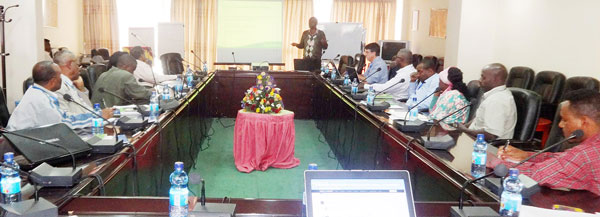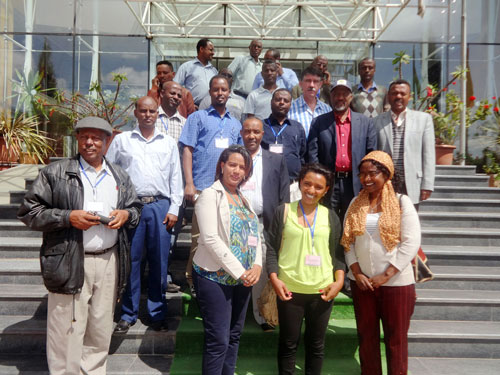By Diriba Hika/CIMMYT
A training session on seed business management gave Ethiopian agriculture managers a deeper knowledge that they said would enable them to help fill the gap in the supply of quality protein maize to the nation’s farmers.
The training was organized by CIMMYT’s Nutritious Maize for Ethiopia (NuME) project funded by the Canadian Department of Foreign Affairs, Trade and Development and conducted by CIMMYT senior scientists working in Africa as well as experts from the Ethiopian Ministry of Agriculture, Integrated Seed System Development-Ethiopia and the Alliance for Green Revolution in Africa-Ethiopia. The trainees were managers drawn from national agricultural research systems, the Ministry of Agriculture, farmers’ cooperative unions and private and public seed companies. Of the 16 trainees, three were women.

Dr. Asnake Fikre, crop research director of the Ethiopian Institute of Agriculture, told participants that “regardless of the significant public sector investments made to provide farmers with better seeds, the national seed system could not do what was expected of it.” He encouraged the seed company mangers to apply the training to improve efficiency in their businesses.
Asnake discussed the government’s recent efforts to address issues relating to seed quality, efficiency, diversification and sustainability, including a revised seed law that recognizes the importance of a pluralistic seed sector and encourages cooperation with the global seed industry. Also, the Ministry of Agriculture approved direct marketing of maize hybrid seed in the country this year.
As part of the training, the managers were given two helpful reference materials: a manual prepared by CIMMYT’s Global Maize Program and the book Seed Business Management in Africa, written by John MacRobert, a former CIMMYT seed systems specialist. “The training is of international standard,” one participant said. “It helped us to see where we are, what we lack and what we can do better in the future. As a manager, I found the training very helpful in decision-making in the business.”

The NuME project is working to provide quality protein maize seed to the rural poor who rely on maize as their staple food by building the capacity of seed companies and regulatory bodies. This training is a part of the human capacity development targeted by the project to successfully build the seed value chain by producing and marketing high-quality seed to maize growers.
Seed Business Management Syllabus
Topics covered at the training included:
- The seed business cycle and value chain
- Identifying and choosing the right maize varieties
- Basics of maize breeding, variety testing and product release
- Hybrid seed production characteristics
- Distinguishing characteristics of inbred lines, hybrids and open pollinated varieties (OPVs)
- Managing growers and contracts
- Maintenance of inbred line parents and OPVs
- Certification standards and inspection procedures
- Seed physiology, storage and quality
- Warehouse management
- Developing marketing, sales and promotion strategies
- Product distribution and presentation, merchandising
- Dealing with customers
- Overview of seed policy in Africa…
 Capacity development
Capacity development